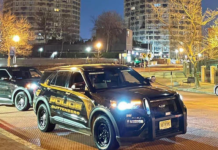While yesterday’s New Jersey Supreme Court decision on Newark’s Civilian Complaint Review Board didn’t yield the results Jersey City activists were hoping for, they are now looking towards the state legislature to grant these boards subpoena power.
By Corey McDonald/Hudson County View
The group of speakers – which included senior supervising attorney with the ACLU’s New Jersey office, Alex Shalom; longtime activists with local advocacy groups, including Pamela Johnson and Chris Gadsden; and former Jersey City police detective Ben Wilson – expressed full support of a CCRB, which, essentially, would provide external oversight over local police departments and its officers.
“We are not anti-police, we are pro-community,” Johnson, the executive director of the Jersey City Anti-Violence Coalition Movement said on a Zoom call last night.
“There is nothing sinister in a CCRB … it can help the community and bridge the gap between law enforcement and residents, because right now there is nothing in place to do so.”
Hanging over the meeting was the state Supreme Court’s 6-1 decision – the result of litigation brought against Newark’s CCRB by the city’s police union – also ruled that the CCRB could not launch an investigation into a matter already being probed by the internal affairs unit of the local police department.
Justice Jaynee LaVecchia wrote for the majority that state lawmakers would have to change the law if a board wants to issue subpoenas.
Panelists described the court’s decision as “the beginning of the process” for communities to establish CCRB’s.
“What the Supreme Court said today was that CCRB’s are permissible, but if you want to have one with subpoena authority, then you have to get the legislature to authorize that,” Shalom said.
Hudson County Assemblywoman Angela McKnight (D-31) currently has a bill in the state legislature to create civilian review boards in every municipality to review and investigate complaints against members of their local police force.
“The Supreme Court has given us a road map for getting subpoena authority … so Assemblywoman McKnight’s bill – will give us that path forward,” Shalom said.
McKnight, in an interview with HCV, said amendments have already been made to the bill to give CCRB’s subpoena power.
The bill (A-4727) passed out of the Community Development and Affairs committee in June, but still has a long way to go before becoming law.
“We’re still in the beginning stages,” McKnight said. “But subpoena power is definitely there.”
“This is not a moment in time, this is, actually, thee time.”
While the conversation surrounding police accountability has ignited in a powerful way after the murder of George Floyd, efforts to create a civilian board in Jersey City date back a number of years.
Activists fighting for police accountability pointed to a number of incidents — Shiron Cooper walking home from work in 2018 when an unmarked police car drove into him; or when Lavon King was shot in the chest by a police officer after he struggled with the officer in the backyard of an Ege Avenue home — where calls for a CCRB went unanswered.
“We have been asking for a CCRB for years,” Johnson said. “This is not a moment in time, this is, actually, thee time.”
The debate reignited earlier this year when a scuffle on Bostwick Avenue turned violent, with many in the black community asserting that body camera footage from the incident unequivocally show at least one officer using excessive force.
“The episode on Bostwick – we know clearly that officer abused his power, but because of (internal affairs), because of politics, because of the police union — they’re going to protect their own, but where are the protections for the community?,” said former Ward B Councilman Chris Gadsden, also the PAC Chair for the Jersey City NAACP.
Furthermore, all the speakers on the call unanimously agreed that police departments seem largely incapable of policing themselves.
When a civilian wants to file a complaint against a police officer, be it for excessive force, a wrongful arrest, or any number of other issues, they must file an internal affairs complaint with the department.
That process is mostly kept secret, with the unit forced to disclose little other than how many complaints they receive.
Data from the JCPD’s professional standards summary report forms show that, between the years 2013 to 2019, the internal affairs unit sustained (or granted legitimacy to) only two of 206 excessive force reports filed by civilians.
“Either we are the only city in the nation whose residents are all liars, or the complaint system our police department uses to protect us just isn’t working right,” local activist Sarah Ligon said.
“Fundamental to the conversation is providing accountability.”
A CCRB without subpoena power would be toothless, according to some activists, and McKnight herself said that “without [subpoena power], a CCRB is moot.”
Local leaders have expressed disappointment in the court’s decision, but put the ball in the state legislature’s court to give community’s investigatory power.
Mayor Steve Fulop said that he was disappointed with the State Supreme Court decision, “as ultimately we think there should always be a healthy check and balance between law enforcement and civilians,” he said.
“The next step is for Gov. Murphy and the state legislature to formally change the law and allow review boards so that this decision is not left to the courts.”
He indicated on Twitter yesterday that he would support a local resolution advocating for these changes.
Meanwhile, Ward E Councilman James Solomon, who has drafted legislation for a Jersey City CCRB, expressed a similar sentiment, noting that now is the time for Trenton lawmakers “to take bold action.”
“Jersey City’s response should be two-fold,” he began.
“First, we can continue our work to put the framework in place for a strong CCRB. Simultaneously, we should partner with allies such as Assemblywoman McKnight in Trenton to pass enabling legislation to authorize strong CCRBs statewide. We cannot let this moment pass.”
Regardless, debate over community policing does not appear to be going away anytime soon.
“I’m looking forward to fight for this bill and community advocates to fight with me so we can make this a reality,” McKnight stated. “I want NJ to be one of the leaders in this regard.”
“Defunding police is about the money, but the broader conversation is about reimagining the role police play in our communities and asking: when you have someone who is suffering from mental illness, is the right person to send a cop, or is it someone who has training in how to address that?” Shalom added.
“These conversations are important conversations, but fundamental to the conversation is providing accountability.”
Follow Corey McDonald on Twitter @cwmcdonald_








